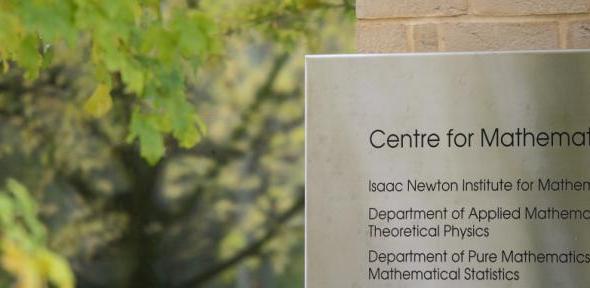
The results from the latest Research Excellence Framework (REF), published in May 2022, have highlighted the world class research being conducted in the Faculty of Mathematics.
The REF is the system for assessing the quality of research in UK higher education institutions and is undertaken by the four UK higher education funding bodies: Research England, the Scottish Funding Council, the Higher Education Funding Council for Wales, and the Department for the Economy, Northern Ireland.
65% of Cambridge’s overall submissions within the Mathematical Sciences Unit of Assessment – to which the two constituent departments of the Faculty have contributed – were rated as ‘world leading’, demonstrating the major impact that researchers in the Faculty are making every day. The Times Higher Education’s rankings placed Cambridge at #2 for Mathematical Sciences in REF 2021.
"We are proud to be leading the way in developing new mathematics for health, life and sustainability, while probing the mysteries of the universe, from the smallest to the largest scales." Professor Colm-cille Caulfield
For the purpose of the REF, academic disciplines are assigned to one of 30 out of a possible 34 units of assessment. Each unit is judged by three criteria – outputs (such as publications, performances, and exhibitions), their impact, and the environment that supports research.
Among the data submitted by universities and other institutions are case studies that describe the impact of their research. These highlight the ways in which mathematicians, statisticians and theoretical physicists in Cambridge have made a real difference - for example through advising the UK Government during the pandemic, developing protocols used in billions of mobile phones worldwide, or Stephen Hawking’s work inspiring future generations to look to the stars.
World-leading research
The Departments of Applied Mathematics and Theoretical Physics (DAMTP) and Pure Mathematics and Mathematical Statistics (DPMMS) returned over 150 academics to the REF. Within the Mathematical Sciences unit of assessment, 65% of Cambridge’s submissions were awarded the highest rating of 4* overall, meaning they are 'world-leading'. This is an increase from 35% in 2014.
The average weighted score – the 'grade point average' – for Mathematical Sciences is 3.70, which compares to 3.36 in 2014.
Professor Colm-cille Caulfield, Head of DAMTP said: "These excellent results reflect the outstanding research of the world-class community of scholars in Mathematical Sciences at the Faculty of Mathematics. Long-standing research activities in theoretical cosmology, high energy physics and fluid mechanics are thriving, while the department is at the forefront of emerging areas such as the mathematical underpinnings of artificial intelligence. We are proud to be leading the way in developing new mathematics for health, life and sustainability, while probing the mysteries of the universe, from the smallest to the largest scales."
Professor Anne Ferguson-Smith, Pro-Vice-Chancellor for Research, added: "I would like to congratulate and thank everyone who has taken part in this year’s REF for all their hard work, which we believe has paid off in these results. What we see today is not just the excellence of Cambridge research, but also the breadth of its impact, with researchers across many disciplines bringing a fresh perspective on how we tackle major problems facing our world today."
You can read more about the overall REF 2021 results in this University of Cambridge news story, and explore two examples of the Faculty of Mathematics' case studies in our feature articles COSMOS: from black holes to Hollywood and Enabling a faster internet and better smartphone performance.
